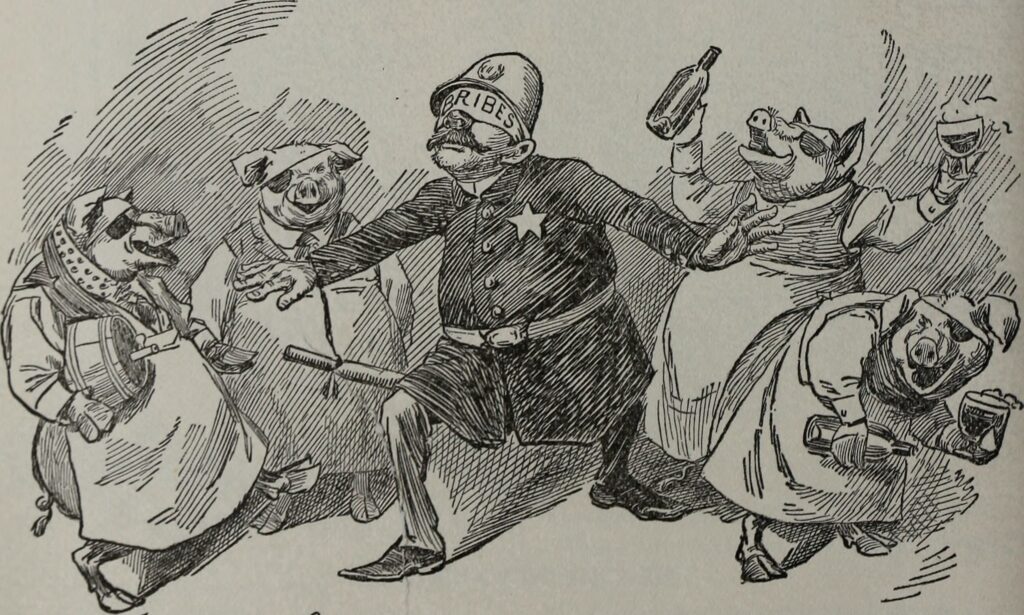In 1829, Sir Robert Peel established the London Metropolitan Police Force and became the “Father of Modern Policing.” He developed nine principles of policing that stem from three core ideas:
- The goal of police was to prevent crime and not catch criminals,
- The key to preventing crime was earning public support, and
- The police earned public support by respecting community principles.
Considering the events of the past 3-5 years, does modern-day policing still represent these core ideas? Where does our cultural raw data come from? Has there been a history of inherent police corruption in North America since the formation of earlier police agencies in the 1800s?
Officers Friday and Gannon in the revived NBC 1960s series, “Dragnet,” were the quintessential LAPD investigators exemplifying courteousness and professionalism with an uncanny wit. The show portrayed police as consummate problem-solving practitioners resolved to solve any crime.
In the 1970s, the world was introduced to Frank Serpico in the screenplay “Serpico,” based on the real-life story of a New City Department police officer of the same name. As a young officer, Serpico discovered that corruption ran rampant in the police department. Untoward officers forced Serpico to accompany them as they collected payoffs from criminals and small businesses. Serpico refused to accept bribe money and attempted to alert his superiors of the corruption, only to be ostracized every time. The officers learned of Serpico’s reporting them and gave him reason to fear for his life, particularly a shooting that left Serpico with auditory damage and believed to have been set up by his fellow officers.
In the early 90s, the world saw the brutality of four police officers’ attack on Rodney King in the streets of Los Angeles during an arrest. A jury later acquitted the four LAPD officers charged with using excessive force, sparking riots in much of the country.
Were these incidents representative of a significant and more widespread problem? Or were there a select few rotten apples who contaminated the overall perception of police as a typical case of projection?
Recent census data shows roughly 1.8 million police officers in the United States and approximately 70,000 police in Canada. That amounts to ratios of 1/184 (police/members of the public) in the US and 1/546 in Canada. For instance, compared to medical practitioners, there are significantly (thousands) fewer police officers per capita. However, of the numerous professions out there, more media, literature, and general consumable content is centered on policing because of the dynamics, risk, and excitement that arise from it. Murder investigations, police pursuits, and long and entangled investigations catch the public’s attention, especially when manufactured and conforming to what sells.
The “CSI Effect” became a common term in the 2000s, when television portrayed the forensic science of policing as uber-efficient (same-day analysis and results) and compelling beyond any doubt. In essence, portrayed as a sure process that cannot fail. Forensic science is not a turnkey solution that provides flawless results despite all the advancements. Making evidence forensically sound in court takes months and often much sub-analysis.
To answer my question above, where does our cultural data come from? It comes from police dramas, legal thrillers, conspirator double-crossing spy novels, and military action thrillers. Media can undoubtedly play a role in driving our antipathy toward the police. When media shapes and molds our views and expectations do not align with tangible outcomes, we tend to develop biases and make assumptions using terms like “systemic.” Although there is always work to do to improve things, we do not need to re-engineer modern-day policing founded on Sir Robert Peel’s sound principles many years ago. Instead, we need to understand why we believe what we do. It may be for reasons we have never consciously considered.
“Everything that irritates us about others can lead us to an understanding of ourselves.” ― C.G. Jung.

